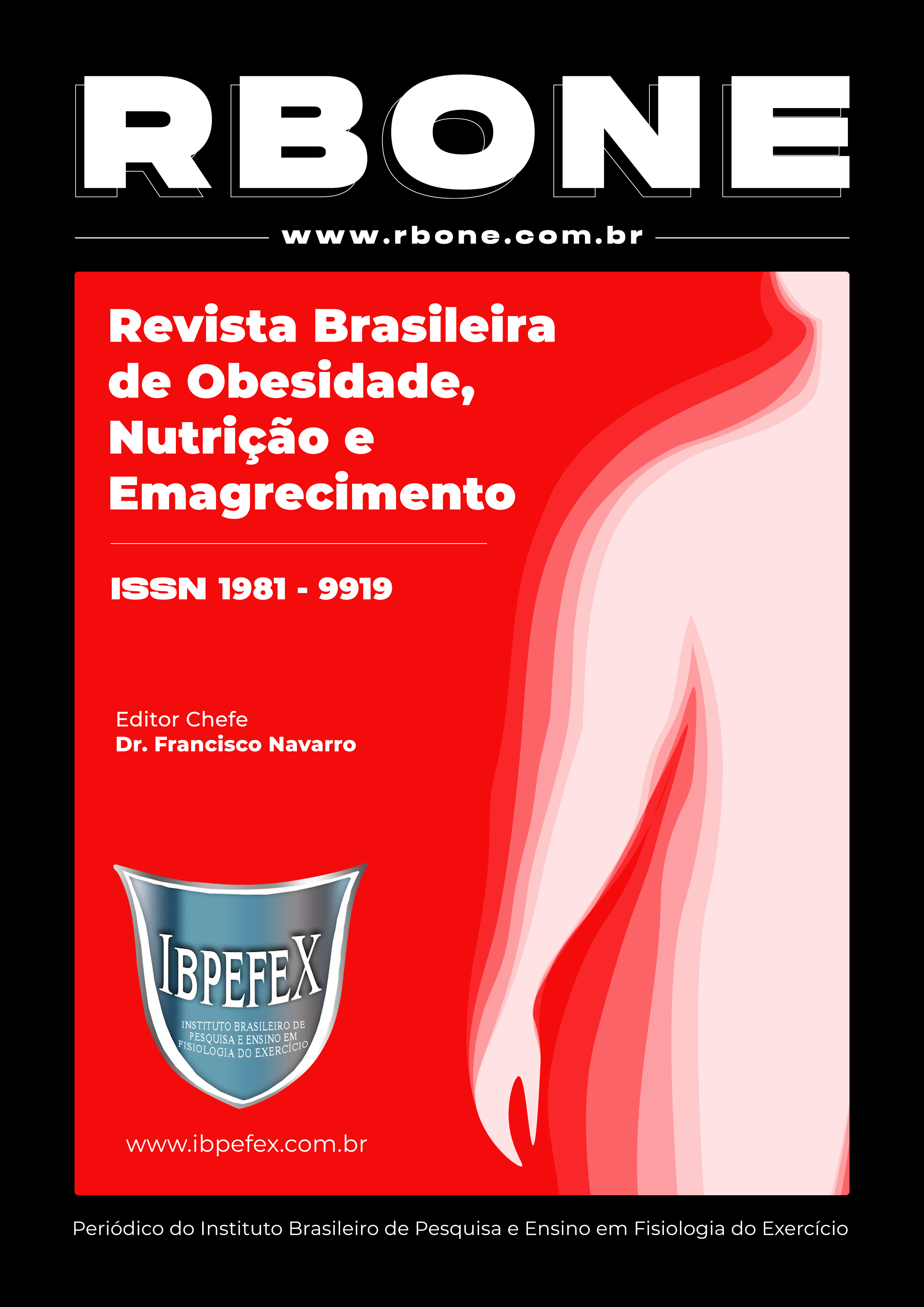Vitamin B12 deficiency in patients after bariatric surgery: A study on nutritional self-knowledge
Abstract
Bariatric patients should undergo continuous vitamin B12 replacement, as well as adequate monitoring by health professionals in the preoperative period, in the immediate postoperative period and throughout life. The objective of this research was to analyze the self-knowledge of patients who underwent bariatric surgery, regarding vitamin B12 deficiency, its symptoms and nutritional education regarding replacement. In methodological terms, this is a research with a quantitative approach, with a cross-sectional nature, in which bariatric patients filled out a questionnaire via Google Forms, on questions related to the proposed objective. From the data collected, a description of the studied sample was carried out, in which it was observed that this was composed mostly of women, with the majority in the age group of 42 to 49 years. In the postoperative period of bariatric surgery, 68% had vitamin B12 deficiency, considering the vitamin deficiency in the first moment. Already 24% reported memory loss and 22% reported frequent fatigue and weakness. As for vitamin B12 replacement, 42% were instructed to replace it orally and 34% did it intramuscularly, but about 36% of the study sample reported not following the recommended replacement. In short, bariatic patients are self-aware of vitamin B12 deficiency and the symptoms of this absence in the body. Furthermore, these individuals begin treatment with replacement, but report not continuing with this follow-up, making it necessary to provide further guidance from professionals related to bariatric surgery in view of the importance of this follow-up being carried out periodically, in order to properly instruct these individuals regarding their food and nutrition education.
References
-ABESO. Associação Brasileira para o Estudo da Obesidade e da Síndrome Metabólica. Diretrizes brasileiras de obesidade. 4ª edição. São Paulo-SP. 2016.
-AACE/TOS/ASMBS. American Association of Clinical Endocrinologists. The Obesity Society. American Society for Metabolic & Bariatric Surgery. Medical Guidelines for Clinical Practice for the perioperative nutritional, metabolic, and nonsurgical support of the bariatric surgery patient. Surgery for Obesity and Related Diseases. Vol. 4. Num. 5. 2008. p. 109-84.
-Brasil. Ministério da Saúde. Secretaria de Vigilância em Saúde; Departamento de Vigilância de Doenças e Agravos não Transmissíveis e Promoção da Saúde. Vigitel Brasil 2014: vigilância de fatores de risco e proteção para doenças crônicas por inquérito telefônico. Brasília. 2015.
-Brasil. Ministério da Saúde. Secretaria de Atenção à Saúde; Departamento de Atenção Básica. Programa Nacional de Suplementação de Ferro: manual de condutas gerais. Brasília. 2013.
-Brasil. Ministério da Saúde. Secretaria de Atenção Primária à Saúde; Departamento de Promoção da Saúde. Manual de atenção às pessoas com sobrepeso e obesidade no âmbito da Atenção Primária à Saúde (APS) do Sistema Único de Saúde. Brasília. 2022.
-Bordalo, L.A.; Mourão, D.M.; Bressan, J. Deficiências nutricionais após cirurgia bariátrica, por que ocorrem? Acta Medica Portuguesa. Vol. 24. Num. 4. 2011. p. 1021-1028.
-Carvalho, A.S.; Rosa, R.S. Cirurgias bariátricas realizadas pelo Sistema Único de Saúde - 2010 a 2016: uma análise das hospitalizações. Epidemiologia e Serviços de Saúde. Vol. 28. Num. 1. 2019. p. 2018260.
-Franco, S.; Vieira, C.M.; Oliveira, M.R.M. Objetificação da mulher: implicações de gênero na iminência da cirurgia bariátrica. Revista Estudos Feministas. Vol. 30. Num. 3. 2022. p. 79438.
-Farias, A.A.; Soares, J.F.; César, C. C. Introdução à Estatística. 2ª edição. Rio de Janeiro. LTC. 2008.
-Garrido Junior, A. B. Cirurgia da obesidade. São Paulo. Atheneu. 2006.
-International Federation for the Surgery of Obesity and Metabolic Disorders (IFSO). 5th IFSO Global Registry Report. Naples. Italy. IFSO. 2019.
-Johnson, L.A. Deficiência de vitamina B12. Manual MSD. Versão para Profissionais de Saúde. 2022.
-Marcondes, N.A.V.; Brisola, E.M.A. Análise por triangulação de métodos: um referencial para pesquisas qualitativas. Revista Univap. Vol. 20. Num. 35. 2014. p. 201-208.
-Pezzin, I.M.; Fioresi, M.; Furieri, L.B.; Fiorin, B.H.; Bolsoni-Lopes, A. Risco de Infecção e Motilidade Gastrintestinal Disfuncional: Diagnósticos mais frequentes no pós-operatório de Cirurgia Bariátrica. Enfermagem em Foco. Vol. 11. Num. 6. 2020. p. 126-34.
-SBCBM. Sociedade Brasileira de Cirurgia Bariátrica e Metabólica. Especialistas da SBCBM lançam consenso clínico inédito na área de Psicologia. 2015. Disponível em: https://www.sbcbm.org.br/especialistas-da-sbcbm-lancam-consenso-clinico-inedito-na-area-depsicologia/. Acesso em: 24/04/2023.
-SBCBM. Sociedade Brasileira de Cirurgia Bariátrica e Metabólica. Colégio Brasileiro de Cirurgiões; Colégio Brasileiro de Cirurgia Digestiva; Sociedade Brasileira de Cirurgia Laparoscópica; Associação Brasileira para o Estudo da Obesidade; Sociedade Brasileira de Endocrinologia e Metabologia. Consenso Brasileiro Multissocietário em Cirurgia da Obesidade. 2006.
-SBCBM. Sociedade Brasileira de Cirurgia Bariátrica e Metabólica. Cirurgia Bariátrica - Técnicas cirúrgicas. SBCBM. 2017.
-Swinbur, B.K.; Allender, V.I. The Global Syndemic of Obesity, Undernutrition, and Climate Change: The Lancet Commission Report. Lancet. Vol. 393. 2019. p. 791-846.
-Zubiaurre, P.R.; Bahia, L.R.; Rosa, M.Q.M.; Assumpção, R.P.; Padoin, A.V.; Sussembach, S.P.; da Silva, E.N.; Mottin, C.C. Estimated costs of clinical and surgical treatment of severe obesity in the Brazilian Public Health System. Obesity Surgery. Vol. 27 Num. 12. 2017. p. 3273-80.
Copyright (c) 2024 Alessandra Aparecida de Resende Pereira, Jaqueline Aparecida Resende Neves, Viviane Aparecida Almeida, Tamara Aparecida Reis de Freitas, Thainá Richelli Oliveira Resende, Samyra Giarola Cecílio, Douglas Roberto Guimarães Silvia

This work is licensed under a Creative Commons Attribution-NonCommercial 4.0 International License.
Authors who publish in this journal agree to the following terms:
- Authors retain the copyright and grant the journal the right of first publication, with work simultaneously licensed under the Creative Commons Attribution License BY-NC which allows the sharing of the work with acknowledgment of the authorship of the work and initial publication in this journal.
- Authors are authorized to enter into additional contracts separately for non-exclusive distribution of the version of the work published in this journal (eg, publishing in institutional repository or book chapter), with acknowledgment of authorship and initial publication in this journal.
- Authors are allowed and encouraged to post and distribute their work online (eg, in institutional repositories or on their personal page) at any point before or during the editorial process, as this can bring about productive change as well as increase impact and impact. citation of published work (See The Effect of Free Access).






